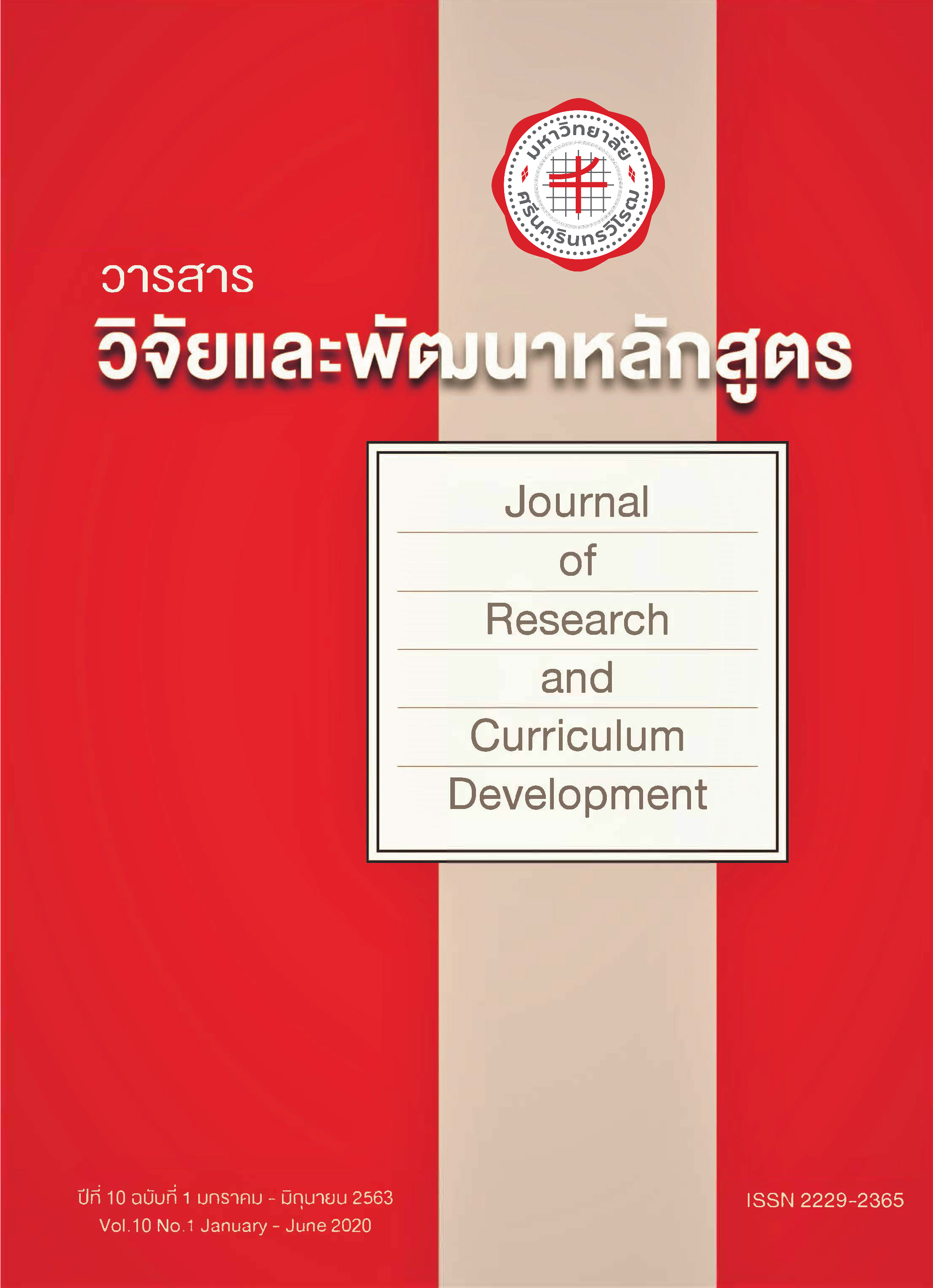รูปแบบการจัดการศึกษาบูรณาการเชิงสร้างสรรค์เพื่อเสริมสร้างอัตลักษณ์บริการ ด้วยหัวใจความเป็นมนุษย์ของนักศึกษาพยาบาล วิทยาลัยพยาบาลบรมราชชนนี ราชบุรี Integrated Creatively Educational Management Model for Promoting Humanized Care Identity of Nursing Student
research and development
Keywords:
integrated creatively educational model, humanized care identity, nursing educationAbstract
The study aimed to develop an integrated creatively educational management model for promoting humanized care identity of nursing students, Boromarajonani College of Nursing, Ratchaburi and evaluate the effectiveness of integrated creatively educational management model created. The study was composed of four phases, 15 steps as following details; phase 1: analysis of fundamental data comprising three steps with using the document analyses and focus group of persons related, phase 2: creating a draft of the model and developing humanized care identity questionnaires, including conducting seven steps of model trails using operational participative meetings with experts and doing trails, phase 3: trying out the model adjusted, one step of using the model in a nursing course, and phase 4: evaluating the effectiveness and making approval on the model tested, comprising three steps using the humanized care identity questionnaires and connoisseurship. The results revealed as the followings.
- The integrated creatively educational management model for promoting humanized care identity of nursing students, Boromarajonani College of Nursing, Ratchaburi was composed of 5 stages; 1) context analysis for developing the model, 2) building growth mindset and passion in learning of teachers and students, 3) conducting the learning process mentioned in the model with six steps of learning, 4) coaching and evaluating for learning, and 5) concluding lessons learned and sharing. Supporting factors were policies and strategies, teachers’ skills in building growth mindsets and passions of the students.
The effectiveness evaluation of the integrated creatively educational management model created showed that; 1) the average score of humanized care identity of the students after using the model was higher than the one before with 0.05 significance. Findings from qualitative data analysis were students having improved health service behaviours, acknowledging more values of providing nursing care, and having more self-understands and self-developments. 2) The teachers’ behaviours relating teaching and learning performances to promote humanized care identity was in very good level ( = 4.54 , S.D. = 0.42), and 3) the clients rated humanized care identity behaviours of the students at very good level ( = 4.52, S.D. = 0.45).
References
พิภพ จิตรนำทรัพย์. (2553). การบริหารโรงพยาบาลเพื่อให้เกิดบริการด้วยหัวใจความเป็นมนุษย์. วารสาร
วิทยาลัยพยาบาลบรมราชชนนี นครราชสีมา, 16(2), 64-71.
เพ็ญจมาศ คำธนะ และจิริยา อินทนา. (2554). ต้นแบบการสอนบูรณาการด้วยหัวใจความเป็นมนุษย์: ชุดวิชาการพยาบาล. วิทยาลัยพยาบาลบรมราชชนนีราชบุรี.
เพลินตา พรหมบัวศรี, อรพิน สว่างวัฒนเศรษฐ์, จิราภรณ์ อนุชา และคณะ. (2560). รูปแบบการศึกษาบูรณาการชุมชนแห่งการเรียนรู้เชิงวิชาชีพ การโค้ช การสะท้อนคิด และการใช้พลังคำถาม วิทยาลัยพยาบาลสถาบันพระบรมราชชนก. Nursing Journal of The Ministry of Public Health, 27(1), 60-72.
มกราพันธุ์ จูฑะรสก, วัชรี อมรโรจน์วรวุฒิ, วิไลวรรณ วัฒนานนท์, เบญจพร ทิพยผลาผลกุล และอนิษฐา จูฑะรสก.(2019). การศึกษาเพื่อการเปลี่ยนแปลง: ความร่วมมือระหว่างสถานศึกษาและสถานบริการในชุมชน. วารสารพยาบาลกระทรวงสาธารณสุข. 29(3), 1-17.
มูลนิธิเพื่อการพัฒนาการศึกษาบุคลากรสุขภาพ. (2559). ข้อเสนอแนะการพัฒนาการจัดการศึกษาวิชาชีพสุขภาพ เฉพาะประเด็นเพื่อปฏิรูปสถาบันการศึกษาและการเรียนการสอน. กรุงเทพมหานคร: เดอะกราฟิกซิสเต็ม.
วรวิทย์ ชัยพรเจริญศรี, บุญสืบ โสโสม, และ กนกอร ชาวเวียง. (2560). การทบทวนความรู้งานวิจัยด้านการจัดการเรียนการสอนที่พัฒนา คุณลักษณะหัวใจความเป็นมนุษย์: กรณีศึกษาวิทยาลัยพยาบาลบรมราชชนนี พระพุทธบาท. Journal of Public Health Nursing, 31(1), 146-159.
วิจารณ ์พานิช. (2558). การเรียนร้สู่การเปลี่ยนแปลง: Transformative learning. กรุงเทพมหานคร: มูลนิธิสยามกัมมาจล.
วิชัย วงษ์ ใหญ่ และมารุต พัฒผล. (2562ก). การจัดการเรียนรู้เพื่อเสริมสร้างกระบวนการทางความคิดเพื่อการเติบโต. สิกขาวารสารศึกษาศาสตร์, 6(1), 52-60.
วิชัย วงษ์ใหญ่ และมารุต พัฒผล. (2562ข). สร้าง Passion ในการเรียนรู้. ศูนย์ผู้นำนวัตกรรมหลักสูตรและการเรียนรู้. www.curriculumandlearning.com. เข้าถึงเมื่อ 30 มี.ค. 2563.
สถาบันพระบรมราชชนก.(2554). คู่มือการดำเนินการเพื่อให้เกิดอัตลักษณ์บัณฑิต สถาบันพระบรมราชชนก พ.ศ. 2554. นนทบุรี: ยุทธรินทร์การพิมพ์.
สุริยะ วงศ์คงคาเทพ. (2553). เอกสารสรุปการประชุมการจัดการความรู้ การสอนแบบบูรณาการ. (1 - 3 เมษายน 2553). แนวคิดหลักการสอนแบบบูรณาการ. กรุงเทพ : โรงพิมพ์องค์การสงเคราะห์ทหารผ่านศึก.
อัญชลีพร อมาตยกุล, วิไลพร ขำวงษ์, พรรณิภา ทองณรงค์. (2557). การเรียนรู้สู่การเปลี่ยนแปลงในการจัดการศึกษาเพื่อผลิตพยาบาลชุมชน: กรณีศึกษาวิทยาลัยพยาบาลบรมราชชนนี ขอนแก่น. วารสารวิจัยระบบสุขภาพ. 8(4), 375-381.
Arnstein, S. R. (1969). A ladder of citizen participation. Journal of the American Institute of planners, 35(4), 216-224.
Ball, C. L. (2016). Sparking passion: Engaging student voice through project-based learning in learning communities. Learning Communities Research and Practice, 4(1), 9.
Cara, C., O’Reilly, L., & Delmas, P. (2018). Feasibility, Acceptability, and Benefits of a Humanistic Educational Intervention: A Qualitative Secondary Analysis of Two Datasets (Quebec and Switzerland). International Journal for Human Caring, 22(3), 98-114.
Johns, C. (1995). Framing learning through reflection within Carper's fundamental ways of knowing in nursing. Journal of advanced nursing, 22(2), 226-234.
Joyce, B. R., & Showers, B. (2002). Student achievement through staff development. (3rd ed.) Alexandria, VA: Association for Supervision and Curriculum Development.
Kleiman, S. (2009). Human centered nursing: The foundation of quality care. FA Davis.
Mezirow, J. (2003). Transformative learning as discourse. Journal of transformative education, 1(1), 58-63.
Mims, C. (2003). Authentic learning: A practical introduction & guide for implementation. Meridian: A Middle School Computer Technologies Journal, 6(1), 1-3.
National Centre for Systemic Improvement. (n.d.). Effective Coaching: Improving Teacher Practice and Outcomes for All Learners.
Power, A., & Wilson, A. (2019). Mentor, coach, teacher, role model: what's in a name?. British Journal of Midwifery, 27(3), 184-187.
Tweedie, K., Yerrell, J., & Crozier, K. (2019). Collaborative coaching and learning in midwifery clinical placements. British Journal of Midwifery, 27(5), 324-329.
Van Manen, M. (1977). Linking ways of knowing with ways of being practical. Curriculum Inquiry, 6, 205-228.





